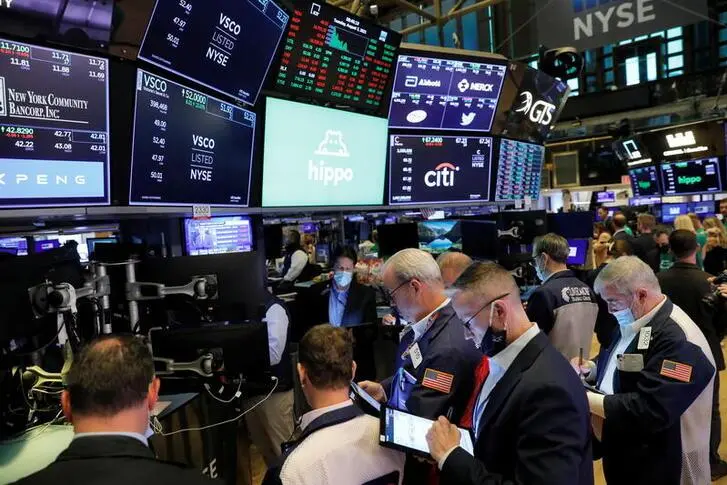PHOTO
(The author is a Reuters Breakingviews columnist. The opinions expressed are her own.)
LONDON - Bonds say growth might be disappointing; equities say otherwise. Central bank static has made both of these financial market signals unreliable guides to the economic outlook. The truth is likely to be in the middle.
Believe benchmark government bonds and the prognosis is gloom and doom. The yield on 10-year U.S. Treasuries has fallen 61 basis points since the end of March, to 1.13%. In normal times that points to an impending economic downturn. Yet equity markets appear to be saying exactly the opposite. The S&P 500 Index on Tuesday closed at a record high and has risen more than 11% since the end of the first quarter.
Neither asset can be trusted given how much central bankers are distorting markets. Federal Reserve Chair Jerome Powell is buying $120 billion of fixed-income assets each month, European Central Bank President Christine Lagarde’s monthly bond purchases total 100 billion euros, and Bank of Japan Haruhiko Kuroda’s policy is to spend as much or as little as it takes to keep 10-year Japanese government bond yields close to 0%.
Such policies have pushed yields on benchmark German government bonds going out to 30 years below zero and meant that benchmark 10-year Japanese debt didn’t trade at all on either Monday or Tuesday. They are also depressing yields on Treasuries even though the U.S. bond market is the most liquid in the world. And while neither Powell nor Lagarde are buying stocks, what happens to bonds has a knock-on impact on equities. For example, when benchmark bond yields fall, so do the discount rates applied to future earnings, leading investors to value future earnings more highly than they did before. And when fixed-income returns dwindle, investors hunt for better returns in stock markets.
The reality is likely to be neither as bad as bonds imply nor as good as stocks suggest. The peak for economic growth, corporate earnings, and monetary policy stimulus is passing. But economies will continue to expand and central bankers’ asset buying will remain sizeable, even if Powell decides to scale his purchases back a bit. Neither equities nor debt markets are pointing to so-so growth, yet that may be the most likely outcome.
CONTEXT NEWS
- The S&P 500 Index closed at a record high of 4,423.15 on Aug. 3. The U.S. equities benchmark has risen 11.3% since the end of March.
- The yield on the benchmark 10-year U.S. government bond has fallen 61 basis points since the end of March, to 1.13%.
(The author is a Reuters Breakingviews columnist. The opinions expressed are her own.)
(Editing by John Foley and Amanda Gomez) ((For previous columns by the author, Reuters customers can click on PATTANAIK/ SIGN UP FOR BREAKINGVIEWS EMAIL ALERTS http://bit.ly/BVsubscribe | swaha.pattanaik@thomsonreuters.com; Reuters Messaging: swaha.pattanaik.thomsonreuters.com@reuters.net))





















